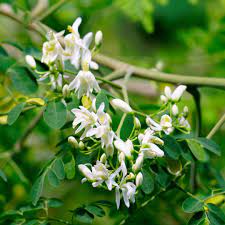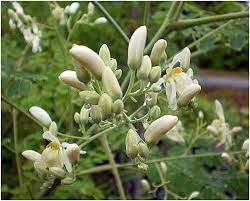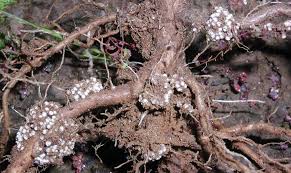Moringa Terminal Buds: Economic Importance, Uses, and by-Products
Moringa terminal buds, often referred to as “drumstick tips” or “moringa pods,” are highly nutritious. They are rich in vitamins, minerals, and antioxidants, including vitamin C, vitamin A, calcium, and potassium. The terminal buds of the Moringa tree are a popular ingredient in various cuisines, especially in South Asian and Southeast Asian dishes. They are used in curries, soups, stews, and salads. Moringa terminal buds have a mild, slightly nutty flavor, similar to asparagus. They are tender and succulent when cooked and can be used in a wide range of recipes.
Moringa is often considered a superfood due to its nutritional content. The terminal buds, like other parts of the Moringa tree, are believed to offer numerous health benefits, including improved digestion, enhanced immune function, and potential anti-inflammatory properties. Moringa trees are commonly grown in tropical and subtropical regions. If you live in such an area or have access to Moringa products, you can often find fresh or dried terminal buds in local markets.
To prepare Moringa terminal buds for cooking, you can remove the tough stems and cook them like you would with other vegetables. They can be sautéed, steamed, or used in various recipes to add nutritional value. In addition to the terminal buds, Moringa leaves are also edible and highly nutritious. They are commonly used in a similar way in cooking and are often dried and ground into a powder to make Moringa leaf powder, a popular dietary supplement.
Including Moringa terminal buds in your diet can be a great way to add a nutritious and unique ingredient to your meals, and it can contribute to a well-rounded and healthy diet.
The Economic Importance and Uses of Moringa Terminal buds

Moringa, also known as Moringa oleifera, is a versatile and economically important plant known for its numerous uses and benefits. Terminal buds, which are the growing tips at the end of branches, can be used in various ways for their economic importance.
Here are some of the economic and practical uses of Moringa terminal buds:
1. Nutritional Value: Moringa terminal buds are rich in essential nutrients, including vitamins (A, C, and K), minerals (calcium, potassium, iron), and amino acids. They are a valuable source of nutrition, making them a potential ingredient in dietary supplements and functional foods.
2. Edible Greens: The young terminal buds can be consumed as a green vegetable. They are often used in salads, soups, stews, and other culinary dishes. The buds are known for their unique, slightly peppery flavor.
3. Medicinal Uses: Moringa terminal buds have been traditionally used in herbal medicine for their potential health benefits. They are believed to have anti-inflammatory, antioxidant, and antimicrobial properties, and are used to treat various ailments.
4. Pharmaceuticals: The bioactive compounds in Moringa terminal buds, such as quercetin and kaempferol, have pharmaceutical applications. These compounds can be extracted and used in the production of drugs and supplements.
5. Cosmetics: Moringa extracts from the terminal buds are utilized in the cosmetics industry for skincare products, as they can help with moisturizing, skin rejuvenation, and protection against environmental stressors.
6. Animal Feed: Moringa terminal buds can be used as a valuable component in animal feed. They provide a good source of protein and other essential nutrients for livestock, which can result in healthier animals and increased productivity.
7. Biofuel Production: Moringa oil, obtained from the seeds, is used for biodiesel production. The terminal buds can be used to grow Moringa trees for oil extraction, contributing to the renewable energy sector.
8. Soil Improvement: The leaves and stems of Moringa plants, including the terminal buds, can be used as green manure and organic fertilizer. They help improve soil fertility and structure, which is important for agriculture.
9. Water Purification: Moringa seeds and leaf extracts have been used for water purification. They can help remove impurities and clarify turbid water, making it safer to drink. This technology can be economically valuable in areas with limited access to clean water.
10. Horticultural Use: Moringa plants, including terminal buds, are used in horticulture as ornamental and shade trees. They can enhance the aesthetic appeal of gardens and public spaces.
11. Economic Empowerment: Cultivating Moringa for its various uses can create income opportunities for farmers, especially in regions with favorable growing conditions. It can be a sustainable source of income for small-scale growers.
Read Also: Moringa Seeds: Economic Importance, Uses, and By-Products
12. Environmental Benefits: Moringa cultivation can help combat deforestation, soil erosion, and desertification by providing a fast-growing, drought-resistant, and multipurpose tree that can be integrated into agroforestry systems.
The Products and By-products That Can Be Derived From Moringa Terminal buds
Moringa, often referred to as the “drumstick tree” or “horseradish tree,” is a plant native to parts of Africa and Asia. It is known for its numerous uses and nutritional benefits. The terminal buds of the Moringa tree, in particular, can yield various products and by-products.
Here’s a list and explanation of some of them:
1. Moringa Leaves: The young terminal buds of Moringa are tender and edible, often used as a nutritious leafy green vegetable. They are rich in vitamins, minerals, and antioxidants, making them a valuable addition to various dishes.
2. Moringa Flowers: The flowers of the Moringa tree are also edible and can be used in salads or as a garnish. They have a mild, slightly peppery flavor.
3. Moringa Oil: The seeds from the Moringa pods can be used to extract Moringa oil. This oil is rich in oleic acid and is used for cooking, as a skin moisturizer, and in the production of cosmetics and hair care products.
4. Moringa Seeds: Moringa seeds can be used directly as a nutritious snack or ground into a powder. The powder is often used as a coagulant in water purification and in the production of various products like Moringa oil.
5. Moringa Seed Cake: After extracting the oil from the seeds, the leftover seed cake can be used as a natural fertilizer or as animal feed due to its high protein content.
6. Moringa Tea: Dried Moringa leaves and flowers can be used to make Moringa tea, a popular herbal infusion known for its health benefits.
7. Moringa Powder: Moringa leaves and pods can be dried and ground into a fine powder. Moringa powder is a nutritious supplement rich in vitamins, minerals, and antioxidants. It can be added to smoothies, soups, and various dishes.
8. Moringa Capsules or Tablets: Moringa powder can be encapsulated or compressed into tablets for easier consumption as a dietary supplement.
9. Moringa-based Skincare Products: Moringa oil and Moringa leaf extract are used in the cosmetic industry to create skincare products like lotions, creams, and soaps due to their moisturizing and antioxidant properties.
10. Moringa Fiber: The remaining plant material after oil extraction can be used as fiber for making paper, textiles, and other products.
11. Moringa for Water Purification: Moringa seeds contain natural coagulants that can be used in water purification processes to remove impurities and pathogens from water sources.
12. Moringa Compost: The waste parts of Moringa plants can be composted to create nutrient-rich organic fertilizer for gardening and agriculture.
13. Moringa as Livestock Feed: Moringa leaves and seed cake can be fed to livestock as a nutritious supplement to enhance their diet.
In conclusion, these are just some of the products and by-products that can be derived from the terminal buds and other parts of the Moringa tree. Moringa’s versatility and high nutritional content make it a valuable resource for both human consumption and various industrial applications.
Read Also: What is Daisy Flower? Benefits, Uses and Importance









